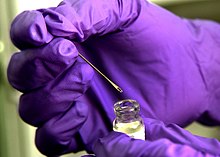Bifurcated needle


The bifurcated needle is a narrow steel rod, approximately 5 cm (2 in) long with two prongs at one end.[1] It was designed to hold one dose of reconstituted freeze-dried smallpox vaccine between its prongs.[2] Up to one hundred vaccinations can be given from one vial of the reconstituted vaccine. The established technique for smallpox vaccination is to dip the needle in the vaccine, and then perpendicularly puncture a person's upper arm fifteen times rapidly in a small circular area. Though skin in the area should be clean, use of an alcohol swab is optional and if used the skin must be allowed to fully dry to avoid deactivation of the live virus vaccine. The punctures should remain in an area approximately 5 mm in diameter. The needle is then disposed of. When done correctly a trace of blood appears at the vaccination site within 10 to 20 seconds after the procedure.[3][4]
The bifurcated needle was created as a more efficient and cost effective alternative to the jet injector previously in use. It was invented in 1965 by Dr. Benjamin Rubin, working at Wyeth Laboratories, and was the primary instrument used during the World Health Organization's 1966–1977 campaign to eradicate smallpox.[5] Rubin estimated that it was used to administer 200 million vaccinations per year during the final years of the campaign.[2]
References
[edit]- ^ "Six bifurcated needles for smallpox vaccination | Science Museum Group Collection". collection.sciencemuseumgroup.org.uk. Archived from the original on 2022-05-20. Retrieved 2022-05-20.
- ^ a b Rubin, Benjamin (1980). "A note on the development of the bifurcated needle for smallpox vaccination". WHO Chronicle. 34 (5): 180–81. PMID 7376638.
- ^ "Smallpox Vaccine Administration". CDC. Archived from the original on 3 April 2020. Retrieved 23 March 2020.
- ^ Tucker, Jonathan B. (2001). Scourge: The Once and Future Threat of Smallpox. New York: Grove Press. pp. 72–73. ISBN 9780802139399. OCLC 50734227.
- ^ "Benjamin A. Rubin". National Inventors Hall of Fame. Archived from the original on 5 December 2010. Retrieved 23 March 2020.
